Obituary: Brian Friel
- Published
BBC News NI Arts Correspondent Robbie Meredith looks back at Brian Friel's career
Brian Friel was known as the Irish Chekhov.
He was acknowledged as one of the great playwrights of his generation.
His work was performed in theatres across the globe from the USA to Russia - where at one point three of his plays were running at the same time.
Friel was also, famously, a quiet man who shunned the limelight. He made his statements on the stage and let his plays speak for themselves.
His first major stage success - Philadelphia Here I Come - was the hit of the Dublin Theatre Festival in 1964 and went on to Broadway.
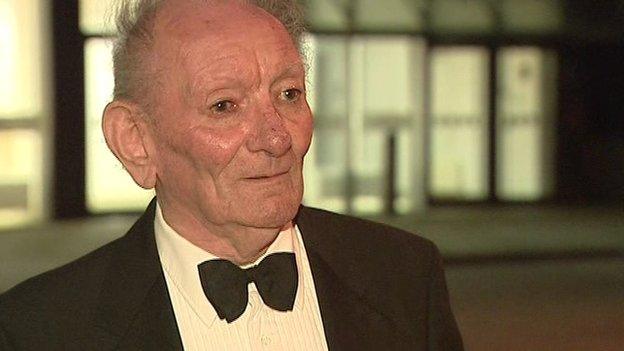
Brian Friel at the People of the Year awards in Belfast in 2009 when he received a lifetime achievement award
In the 1970s, a young unknown actor Liam Neeson would win plaudits for his role in the play on the Irish amateur drama circuit, setting him on a path to international fame.
Among the best known of Friel's plays are: Lovers, The Freedom of the City, Faith Healer, Translations and Dancing at Lughnasa.
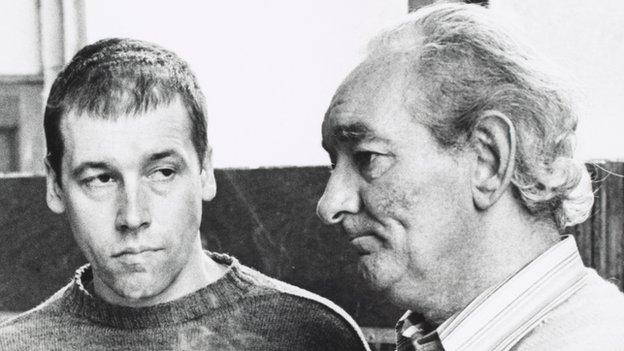
Actor Stephen Rea with Brian Friel when they co-founded Field Day in 1980
Brian Friel was born in Killyclogher, County Tyrone, on either 9 or 10 January 1929. There has always been confusion about the birth date.
In a rare radio self portrait, he said he was the "son of a teacher and grandson of peasants who could neither read nor write".
His sense of self and of religious, rural Ireland in contrast to the more progressive Ireland of the north would feature prominently in his work.
Friel's father, Patrick, was a teacher and his mother, Mary McLoone, came from Glenties, County Donegal.
Spiritual home
He moved to Londonderry when he was 10 and grew up there. He always declared a deep love for the city.
He attended St Columb's College, the alma mater of other Irishmen who would go on to grace the world stage in the arts and in politics: Seamus Heaney, John Hume and Seamus Deane.
After school, Friel went to Maynooth College to study for the priesthood, an experience that he later described as "very disturbing".
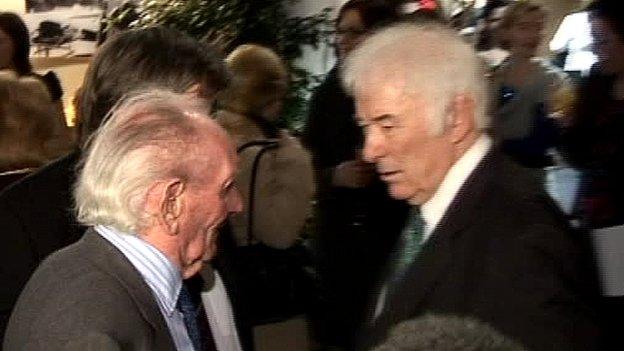
Brian Friel in conversation with Seamus Heaney at the opening of the theatre named in his honour at Queen's University, Belfast in 2009
He returned to teach in Derry and to write.
In 1954, he married Anne Morrison and they had five children: Mary, Paddy (who predeceased him), Judy, Sally and David.
He began writing short stories but quickly found his spiritual home in the theatre. His first play, A Sort of Freedom, written for radio, was broadcast by the BBC in 1954.
After 10 years, he left teaching and went to the Tyrone Guthrie Theatre in Minneapolis, America, where, he said, he found liberation and an assured sense of self and from that, came his breakthrough play in 1964, Philadelphia, Here I Come, which went to Broadway.
Artistic response
He moved away from Derry to County Donegal in 1966 but he always had strong links to the city and said that every going away was "a wrench" and every return "a fulfilment".
His plays are poetic and one enduring theme is the power of memory.
"It is not the literal past, the "facts" of history, that shape us," he said, " but images of the past embodied in language.
In 1980, he co-founded the Field Day Theatre Company with actor Stephen Rea that proved brave, controversial and unique. It was formed in an atmosphere of riots and looming hunger strikes.
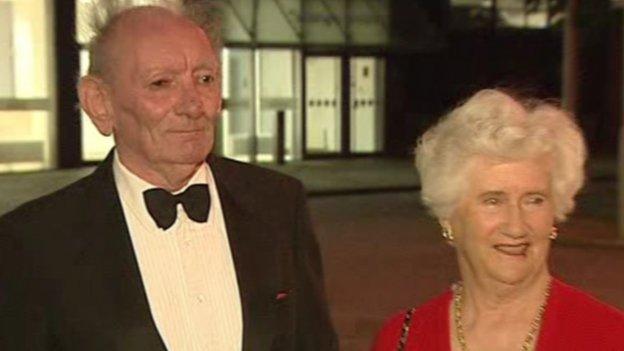
Brian and Anne Friel in Belfast in 2009
It became an artistic response to the violence and the politics that divided Northern Ireland at that time during the Troubles.
Field Day was a travelling theatre company that opened the world of drama to people who might otherwise never have seen it.
Northern Ireland Deputy First Minister Martin McGuinness said: "There was Seamus Deane, Seamus Heaney, Brian Friel and Stephen Rea.
"These were people who were well-grounded within the community and who understood."
Harshness and heartbreak
Stephen Rea said of Friel: "He is completely in tune with Irish audiences.
"There is something innate in the plays where he speaks very directly to an Irish audience and we found the audience for him."
Translations, about the mapping and renaming of Ireland by the English, was the first play performed by Field Day and it opened in Derry at the Guildhall in September 1980.
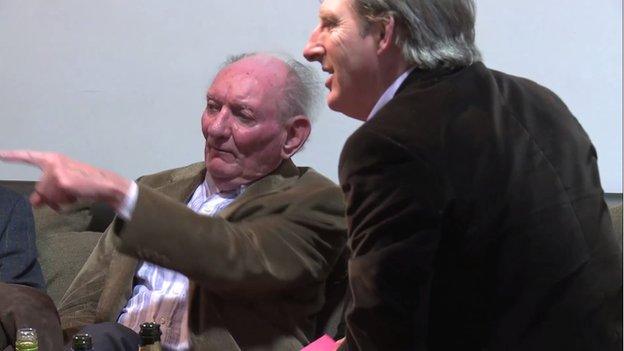
Brian Friel with another Irish actor, Adrian Dunbar
His later plays, such as Dancing at Lughnasa harked back to the traditional culture of rural Ireland and the place where tradition, religion and modernity meet head on.
Ballybeg is the Irish word for small town and it is that small town Ireland that he explores with all its harshness and heartbreak.
Dancing at Lughnasa received three Tony awards in 1992, including best play and a film was made, starring Meryl Streep,
There was one memorable showing of the film in Glenties, Friel's mother's home and the possible inspiration for Ballybeg.
In 1982, Friel was elected to Aosdana, the Irish association to honour artists who have made an outstanding contribution to the arts in Ireland.
He went on to serve in the Irish senate from 1987 to 1989.
In 2005, The Home Place, Brian Friel's last original play, opened and sold out at The Gate Theatre, Dublin, before transferring to London's West End and then on to the Guthrie Theatre in Minneapolis.
The following year, the then Irish president Mary McAleese presented the playwright with a gold torc, in recognition of his election as a Saoi, a wise one, by the members of Aosdana.
Accepting it, he joked: "I knew that being made a Saoi... is extreme unction; it is a final anointment - Aosdana's last rites."